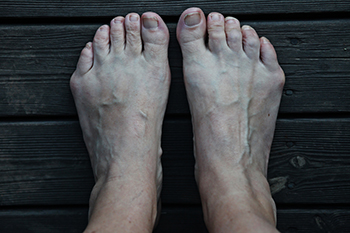
Tailor’s bunion, or bunionette, is a bony bump that forms on the outside of the foot near the base of the little toe. Unlike a traditional bunion, which affects the big toe, a tailor’s bunion results from the little toe pushing towards the fourth toe, causing the joint to protrude. This condition is often caused by wearing tight or narrow shoes that compress the toes, as well as genetic factors that contribute to abnormal foot mechanics. Symptoms include pain, swelling, and redness surrounding the bunionette, which can make wearing shoes uncomfortable. The bump can also cause calluses to develop on the affected area due to increased friction. For persistent issues or severe discomfort from a bunionette, it is suggested you schedule an appointment with a podiatrist to explore treatment options.
If you are suffering from bunion pain, contact one of our podiatrists of Ankle and Foot Centers of Missouri, P.C.. Our doctors can provide the care you need to keep you pain-free and on your feet.
What Is a Bunion?
Bunions are painful bony bumps that usually develop on the inside of the foot at the joint of the big toe. As the deformity increases over time, it may become painful to walk and wear shoes. Women are more likely to exacerbate existing bunions since they often wear tight, narrow shoes that shift their toes together. Bunion pain can be relieved by wearing wider shoes with enough room for the toes.
Causes
- Genetics – some people inherit feet that are more prone to bunion development
- Inflammatory Conditions - rheumatoid arthritis and polio may cause bunion development
Symptoms
- Redness and inflammation
- Pain and tenderness
- Callus or corns on the bump
- Restricted motion in the big toe
In order to diagnose your bunion, your podiatrist may ask about your medical history, symptoms, and general health. Your doctor might also order an x-ray to take a closer look at your feet. Nonsurgical treatment options include orthotics, padding, icing, changes in footwear, and medication. If nonsurgical treatments don’t alleviate your bunion pain, surgery may be necessary.
If you have any questions, please feel free to contact our offices located in the Greater Kansas City area . We offer the newest diagnostic and treatment technologies for all your foot care needs.
